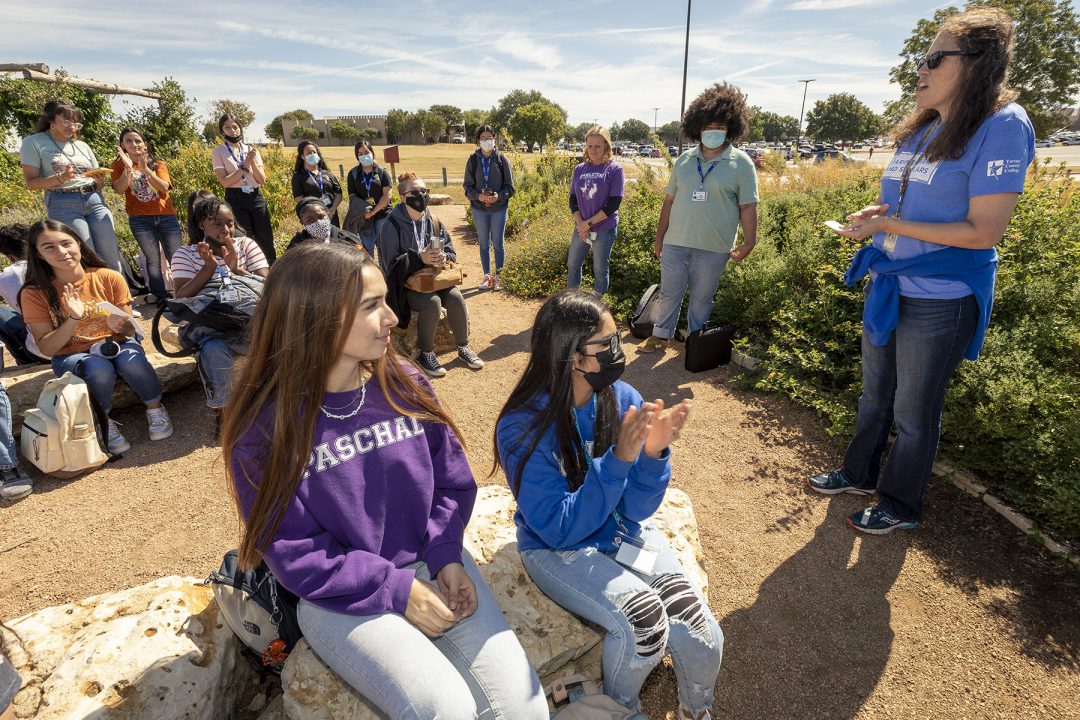As construction has continued in the main thoroughfares of TCC Northwest, one longtime project has been completed in time to offer flexible spaces for meetings and classes.
The Marine Creek Nature Discovery Center, which began seeding in April 2018, now serves as a meeting space, an experiential classroom, a Little Free Library and even a backdrop for graduation portraits. Plans are underway to install a covered pavilion and storage, a geology garden, gravel paths and a temporary structure for the cultivation of native Texas plants, said Greta Bowling, professor of biology and co-team leader for the project.
The space is located northwest of the campus adjacent to the Marine Creek Reservoir. In an era of COVID-19 protocols, the outdoor space provides a relief from increasingly crowded classrooms.
“The advantage of using the Pocket Prairie during COVID is seen through our ability to adequately social distance,” Bowling said. “Additionally, during COVID, many from the MCNDC Team came to campus to continue to maintain the garden. It was a nice escape from the confines of our homes and allowed us to do something good for the College as well as gave us a chance to socialize…socially distanced and masked, of course.”
David Cole, horticulture learning lab manager and co-team leader, also helped install a special feature in the garden in November 2020 — a tree planted in remembrance of a TCC employee’s family member.
“I am honored and humbled to have been asked to help with this meaningful event,” Cole said. “We hope as it continues to grow over the coming years that it will be a beautiful focal point to our campus pollinator garden and honor the family of a devoted TCC employee.”
The HALT 1333 (landscape irrigation) class spent Fall 2021 hard at work in the garden, installing a landscape irrigation system.
“We have done everything from mainline installation around the garden, installing automatic solenoid valves, high efficiency pop up heads with multi-stream rotary nozzles, underground wiring, solar powered irrigation controller, rain/freeze sensor and multiple quick coupler access points for easy water access for hand watering,” Cole said. “This irrigation project is not only a huge benefit to our students that are able to gain real-world experience from the installation process but will also serve future students and the community as a landscape irrigation lab that demonstrates water conservation, healthy plants and countless educational opportunities for all.”
While the space has been useful for life sciences faculty, the team hopes that the space can be utilized by groups across the campus, including academic and staff departments and courses in other disciplines.
“The Pollinator Garden is always a beautiful outdoor facility where we can plan activities or meetings,” said Mark Rhoades, instructor of biology and MCNDC team member. “By utilizing the garden throughout the year, students can observe seasonal changes. It is always beautiful, even when the plants are not necessarily in full bloom.”
The space is available for faculty and staff to book using Ad Astra, and Cole said it is always ready for visitors.
“There is a five-acre prairie restoration on the lake at the farthest northwest corner of our campus property.” he said. “Sunset views are some of the best in Fort Worth. It’s not as far of a walk from your location on TCC Northwest as you think it is.”
Bowling said future plans for the space also include K-12 teacher trainings, community workshops and teacher training. She said the team also welcomes input from others around the campus.
“The space is evolving, and there is room for so much more,” she said. “We openly welcome ideas from interested faculty and staff, as well as those willing to commit to some manual labor!”
A ribbon-cutting ceremony for the space, originally scheduled for April 2020, is being rescheduled to formally introduce the campus community to the garden, which Bowling calls “our little hidden gem.”
“This entire project would not be possible without the willingness of those involved to work hard, the support from our campus/college administrators and facilities personnel and the overwhelming love we have for our students as we strive to create new spaces for them to experience the natural world,” she said. “We don’t want it hidden anymore!

